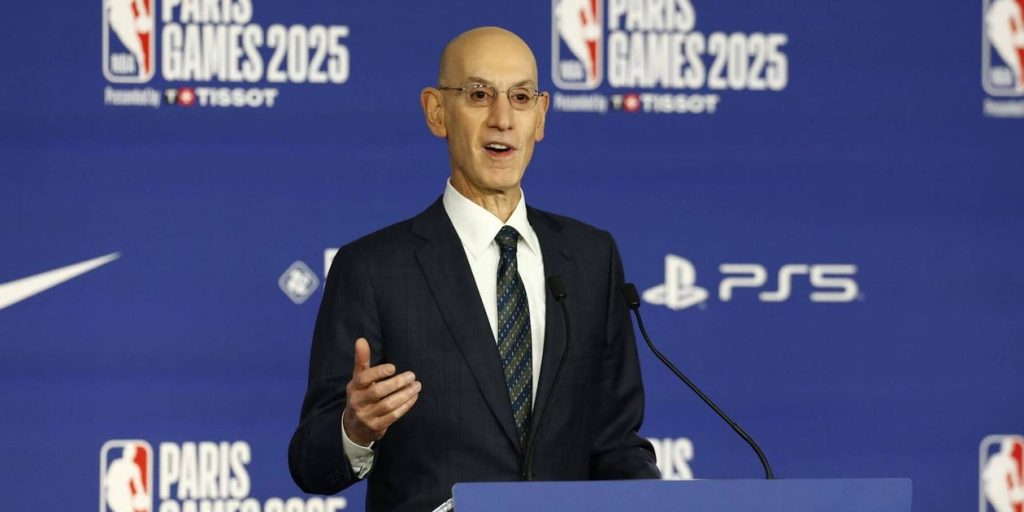NBA commissioner Adam Silver and his chief deputies met with leaders from Spanish conglomerate Real Madrid on Thursday in Paris about the possibility of the club signing on with Silver’s planned European league. Membership from the soccer and basketball juggernaut would mark a significant step in launching the NBA’s overseas venture.
Thursday’s meeting is part of a series of similar discussions Silver, NBA deputy commissioner Mark Tatum and the league’s European and Middle East director George Aivazoglou are having in Europe this week with potential investors and teams for the NBA Europe league Silver is pursuing.
But the NBA’s sit-down with Real Madrid officials, disclosed to The Athletic by American and European basketball sources, is perhaps most important because of Real Madrid’s historical standing in Europe, its unlimited funding because of the success of its soccer operation and its tenuous relationship with the EuroLeague.
Real Madrid is an “A” license holder in the EuroLeague, which is a championship-style series of games on the continent for the top clubs from each national league, with a few stakeholders guaranteed a spot in the EuroLeague each year. Real Madrid is one of those clubs with a guaranteed spot, but its license expires in 2026. Should Real Madrid join Silver’s new venture, other EuroLeague clubs would follow, European sources believe.
A spokesman for Real Madrid did not respond to a message seeking comment, and an NBA spokesman declined to comment on the meetings.
Earlier this week, Silver, Tatum and Aivazoglou met in London with British Prime Minister Keir Starmer and London Mayor Sadiq Khan, who will host the NBA in January for a Global Games series between the Orlando Magic and Memphis Grizzlies. Silver would also want an NBA Europe team in London — a city of nearly nine million people with about 15 million living in the greater metropolitan area.
The United Kingdom is home to soccer’s mighty Premier League and is also another place where the NBA could attract big soccer dollars from Middle Eastern sovereign funds. The British Basketball League’s reigning champion, London Lions, is owned by tech giant Tesonet. The club nearly folded before Tesonet’s 11th-hour purchase in 2024.
Additionally, Silver and his associates met in London this week with representatives from four private equity firms (CVC, RedBird, Bridgepoint and KKR), as well as officials from the Turkish basketball and soccer club Galatasaray.
Silver has more meetings with potential European partners set in Paris, sources said. Prior to his current trip, Silver held multiple discussions with Qatar Sports Investments, which owns soccer giant Paris Saint-Germain, about starting a new Parisian basketball team for Silver’s league, those sources shared. Paris is home to the club Paris Basketball, which plays in the French national league and the EuroLeague, and has home games at both of the city’s large basketball arenas.
Two sources, in America and Europe, also said the NBA met with German basketball power Alba Berlin to discuss, among other topics, its potential joining of Silver’s league. Berlin, like London, is hosting the Magic and Grizzlies in January. Alba Berlin previously announced it would leave the EuroLeague, where it played under a wild-card entry, to join FIBA’s Basketball Champions League — a move that has been viewed as laying the groundwork to eventually join the NBA’s future league.
Tatum previously told The Athletic that Alba Berlin bought “into this vision of a revamped top-tier league in Europe that is going to service fans, the millions of basketball fans in Europe that currently aren’t serviced today.”
Sources on both sides of the Atlantic with knowledge of the NBA’s early talks are watching four existing EuroLeague franchises — Real Madrid, Barca Barcelona, ASVEL Basket of Villeurbanne, of which former NBA superstar Tony Parker is team president, and Fenerbahçe Istanbul — as potential defectors to Silver’s league.
Silver’s new venture could include 16 teams with deep-pocketed investors, some defectors from the EuroLeague and new franchises in major markets like Paris and London. His new European league would include a mix of rights-holding franchises and slots for teams to play their way in by performing well in their national league or FIBA’s Basketball Champions League.
The league’s funding model would be expected to include league ownership stakes for team investors, and it may take two or three years to bring his league online. In a recent interview with The Athletic, EuroLeague chief executive Paulius Motiejūnas said he was “really optimistic” about holding onto his key stakeholder teams.
“There’s a lot of confusion,” Motiejūnas said. “NBA is still exploring. They’re talking about another two, three years. … We are growing. Why would you leave the league which is growing?
“I cannot see the future, but let’s see. We are doing everything that’s in our hands to grow the product and grow the league. And I’m sure the clubs are acknowledging that, and they will stay with us.”
(Photo: Stephanie Lecocq / Reuters via Imagn Images)


